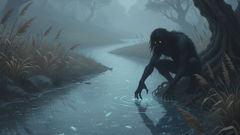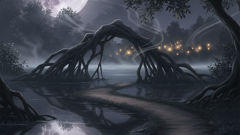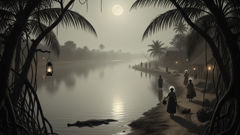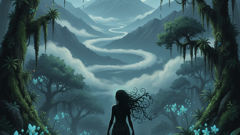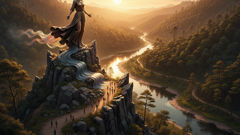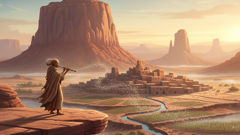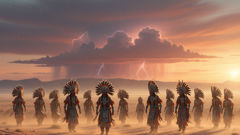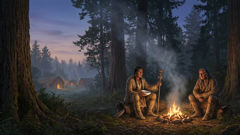Introduction
Along the slow, silver ribbon of the Magdalena and in the dark channels that thread the Amazon tributaries, elders still speak of a being old as the water itself: the Mohán. He is a keeper of eddies and of sudden whirlpools, a figure half-man and half-spirit who chooses to reveal himself in the hiss of mist on a dawn, in the flash of a fish that seems to move with human cunning. The Mohán is mischievous; he steals bait and hooks, tangles lines, and laughs in the language of currents. He is also a guardian: when a river is threatened, his mischief turns to fury. Families that live by the river remember the signs—uneasy cattle refusing the ford, frogs piping three different notes, the cup of a young boy's hat filled with water though the banks are dry—and they make offerings with reverence, not with fear alone. This story does not present the Mohán as a single, simple spirit of malice. He is a complex force shaped by the needs and histories of the people who inhabit the floodplains. In these pages you will walk along moonlit banks, sit in creaking canoes, learn the small rituals fishermen use to placate the river, and meet characters who are tempted, fearful, curious, and sometimes undone by their encounters with the creature. The tale weaves natural detail and human longing into a portrait of a creature at the boundary between land and water, a being who teaches respect for the streams that feed a country and for the fragile bargains people strike with the wild.
River of Secrets
They called the river a mile of mirrors and teeth. In the rainy season it swelled like a sleeping beast, swallowing fields and sending thin islands of palm and guava adrift; in the dry months it became a string of pools, each with a secret depth. The people who lived along its banks learned its grammar rather than its words: the slight slackening of the current meant a log had lodged against the submerged trunk; a sudden, nervous chorus of birds meant a caiman had found a new den. The Mohán spoke in these signs. He made himself known by small thefts—an empty hook where bait had been, a line tangled in knots new to the fisher's practiced hands, a net with its mesh cut clean as thought. In the beginning no one blamed a spirit. The river demanded offerings as much as rain did; the fishermen's grandfathers left sachets of manioc, their children left little wreaths of waterlilies. But legends warped like shadow when the river's generosity did not return with fish.
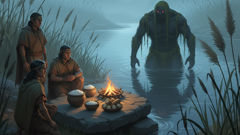
On the far bank where palms threw their long fingers across the water, a small village named Los Meandros persisted. That was where Mateo learned to read water before he could read letters. He would stand on the low bank in the blue hour and trace the eddies with his eyes, seeing how trout, catfish, and the occasional piranha cut through midnight humps of current. Mateo's father, Don Eustaquio, kept the family's line respectful but lean—he taught Mateo every trick for snaring a fish, the times to mend nets, the times to leave them. "Respect the river," he said, as if teaching prayer. "Never insult it with noise or greed. Give thanks and leave the bones to the heron. The Mohán will hear you if you laugh at the water's hunger."
One evening, when the moon was a narrow reed of silver, Mateo went with a friend, Lucía, to try for catfish. They threaded their small canoe between hanging lianas, past a bend where the current moved like a sleeping snake. Lucía had a new braided line, brass hooks that flashed under the stars; she had insisted on putting the best bait at the best time. They lowered themselves into a pool that had always been generous, but the first tug was gone. Then the second. The hooks themselves slipped from the line as if dissolving in mist. Mateo cursed softly, and Lucía smiled with the cold humor of youth. "Probably a trick of the river," she said. "Or a bird."
For the next week the village suffered petty losses that took the shape of the Mohán's humor: bait vanished from baskets, a boy's fishing pole drifted away while tied to a post, and a string of fish hauled in one morning was found turned to a tangle of scales and slime with no head among them. Some elders said this was the doing of children who wanted to frighten one another; others said the Mohán was bored or hungry. The greatest fear came when nets were found whose weave had been rearranged into unfamiliar symbols, like cursive written by a hand made of riverweed. Don Eustaquio convened a council by the cassava oven. They prepared a modest offering—grilled yuca, a cup of corn chicha cooled at the river's edge, a coin wrapped in a banana leaf—and walked to a silent bend where the air seemed to remember another age. They set the food on a flat stone; a boy sprinkled tobacco leaf into a small fire. "Mohán," Eustaquio intoned, not as a name but as a supplication, "take this and give us safe passage and fish enough for our children."
The air thickened like a curtain. From the water rose a sound that was not a voice but a series of wet claps, as if someone were patting the river. A shape uncoiled from the shadows: broad shoulders that hummed with algae, hair like wet rope, a face that was narrow and ancient with eyes that matched the river’s deepest green. He smelled of mud and old fish. The villagers froze, each holding on to faith and fear in equal measures. The Mohán touched the offered chicha with a knuckled finger. He did not smile. He tilted his head, listening to the promise in Don Eustaquio's words. "It is not always theft," a woman whispered, and the Mohán's head turned toward her, acknowledging the sentence that framed his existence. He plucked a small bait from a child's hand and placed it on his tongue, and the villagers saw how his mouth was both gentle and brutal. He took the coin and dropped it without interest into the water. Then he moved back into the reeds like a tide pulling from the shore.
Weeks went by. Fish returned, but something subtle changed. The nets came up heavier in some parts but entirely empty in others. Young men who had mocked the old stories woke with the taste of river silt in their mouths. Lucía, who had once laughed when her hook vanished, now offered a strand of hair tied in a ribbon to a small shrine of river stones. The Mohán, the elders said, accepted gestures and rejections both, a mirror that returned back what it was given. Those who fished with humility found abundance; those who shouted over the water or hauled more than they could carry found their hooks broken and their boats stuck on submerged snags like teeth in a trap. The river taught the village to balance need with restraint, and the Mohán remained as both cautionary tale and guardian spirit, reminding the people that living with the water was never only about taking.
As seasons turned, the Mohán's presence became a living vocabulary in Los Meandros. Children carried small tokens to the bank before their first time fishing; husbands traced a protective line around their wives' heads with water before they walked the path that skirted the river. The creature's mischief—stealing hooks, untying knots, letting a prized fish slip free—was understood less as cruelty and more as a stern teacher's method. When villagers broke the rules—when a merchant's crew dammed a tributary to quicken harvest, or when illegal nets choked a narrow channel—the Mohán answered with a violence that was not coy. He could churn water into a froth that would pull a canoe under; he could call a storm that rifled through huts and left the river's edge strewn with the faltan (the things that were meant to be left untouched). In those moments the Mohán wore the face of retribution, and men would say, humbly, that nature had reclaimed a debt.
But his legend was not only of reproof. There were stories of the Mohán guiding lost children back to shore by nudging a small boat with his giant hand, of him tapping the belly of a feeble fish to set it free when captivity had been cruel, of him, once, plunging his arms into biting nets to free a trapped otter. The people learned to speak to the river in softer vowels, with an accent of offerings and apologies. In this way, the Mohán braided himself into the daily life of the floodplain—sometimes a nuisance, sometimes a scourge, sometimes a savior—always a reminder that rivers keep memory the way some people keep photographs: not perfectly, but with an uncanny, instinctive preservation of past hurts and kindnesses.
Yet not all stories in the village were small and domestic. When the outside world crept closer, with saws and pumps meant to tame the river and factories meant to feed distant cities, the Mohán's temper rose like wind in reeds. Men who came with promises and maps told the villagers they could make life easier: more fish with nets hauled in from the industrial world; more land where the river once lay. Some villagers, hungry and impatient, agreed. Others refused, trusting the slow grammar of the water over foreign calculators. The Mohán's answers became unpredictable, sometimes subtle—bait gone, engines clogged with riverweed—and sometimes violent, an evening when the factory's pumps failed and a bulldozer slid into the mud and refused to move as if the earth itself had taken hold. Those who had bargained for convenience paid a price they had not foreseen. In Los Meandros the lesson grew sharp: the river cannot be owned by ledgers. It remembers the hands that take and the hands that give, and the Mohán is the memory's living edge.
Through it all, new songs were born. Mothers hummed verses about the Mohán's eyes; fishermen spat into their palms and murmured names to ward off his mischief; children played at being him, stalking pets and slipping pebbles into boots to frighten one another. The Mohán had become a teacher and a test. He taught the villagers to look at the water not as a resource to be exhausted but as a neighbor to be tended. He taught them to mourn the loss of a channel and to celebrate the slow return of a shoal of fish. The river kept giving, but not without a ledger of its own, and the Mohán—half guardian, half trickster—was the hand that turned its pages.
The Fisherman's Bargain
Legend has a way of becoming law in small communities; the Mohán's rules were understood even when they weren't written. They were gestures, taboos, and small, repeated rituals sewn into daily practice. But one year, when the rains were late and the river lay thin and panicked, the villagers of Los Meandros faced hunger that could not be soothed with custom alone. Market towns upstream had been dammed; foreign shacks had appeared along feeder creeks to sluice for gold; nets from company boats stripped entire channels clean. Don Eustaquio spoke of leaving, of taking their canoes to a place where the river still remembered how to give. Others argued for bargaining with change: build a new, larger net; accept the pumps and move more product. Mateo, now taller and quieter for his years on the water, listened to both sides and saw desperation crouched in each voice.

One night, after a council that ended with too many promises and too little resolve, Mateo slipped away with his smallest canoe. He had taken to walking the banks when he could not sleep, listening for the river's voice, and that night it seemed to him that the water whispered, not in words, but in a ache that needed attending. He moved down to a pool older than memory and lit a single candle on the bow of his canoe. He had a handful of offerings—a bit of chicha, a strip of dried fish, a coin he had saved from selling a carved spoon in the market. He placed them on a flat stone and called to the Mohán in a way that meant more than begging: "We will not leave you hungry, nor will we take more than the river gives. Help me find a way to keep our children fed." He spoke without honorifics; he spoke like a son returning a favor. The night responded with a slick shiver in the air. Water moved; frogs fell silent.
The Mohán rose before him like a wall of water given flesh. He smelled of riverbed and old rain. His laugh sounded like pebbles rolling in a hidden current. For a long time he only watched Mateo, taking his measure the way a large animal measures a challenger. "You come with a bargain?" the river's sound seemed to ask. "You ask to keep fish for your children while others come to take our veins?" Mateo offered what he had: the coin, the chicha, his promise of careful fishing. He did not ask for an easy miracle; he asked for guidance. The Mohán's face did not soften as a human's might; instead he sank a hand into the water and drew up a line of old rope, brittle with algae, and handed it to Mateo like a tool.
"Use this line with patience," the Mohán seemed to say—if spirits can speak without words, they do so with the shaping of action. "It will find fish where there are fish. But you must teach others not to haul all at once; you must teach them to leave some for the night herons and for the juvenile shoals. When men come with machines and bright lights, lead them instead to places where the river can be shared without being plundered. And if they refuse, remember that the river remembers." Mateo took the rope and felt its teeth. He understood the bargain: it was not a simple trade of wealth for blessing. It was instruction, a compact of knowledge and responsibility.
Word of his meeting leaked slowly. Mateo returned with a haul small but healthy, fish that had texture and life in their bellies. He shared them with those who had thought to leave town, and he taught a method of staggered lines—small nets with spaces—so juvenile fish could pass. He walked to neighboring villages and traded knowledge, teaching them to interpret the river's moods and to leave markers where spawning was most likely. The Mohán, who had always delighted in petty mischief, seemed to warm to this quieter stewardship. He stopped stealing hooks from Mateo's canoe, but he took to tugging at the lines of those who returned with greedy hauls, ensuring they learned the cost of taking too much.
Not all accepted the bargain. A man called Hernando, who had invested in foreign gear and bright lamps that drew fish like a fever, accused Mateo of superstition. He mocked the rituals and called the Mohán an excuse for poverty. When Hernando's crew set net after net in a shallow channel, the river answered in a way that was both slow and terrifying: their engines clogged with a slick of plant roots in a single night; their nets came up torn, as if cut by knives made of water; one boat drifted into a shallow and lodged like a carcass while the men cursed the luck of the rivers. Hernando blamed Mateo and the villagers; he called for violence. But the river had already taught its lesson in another language—one of stuck progress and the grinding humiliation of modern tools that could not understand the living grammar of currents.
Mateo's method was not only about preservation; it became an act of diplomacy. He negotiated with merchants who came seeking quick profit, showing them how a staggered net and a seasonal pause would lead to sustainable yields. He bartered with traders in market towns: a share of fish in exchange for promises to halt dredging. He organized a watch along the creek where illegal sluicers had set up—a slow, human firewall that would not have been possible without the Mohán's initial guidance. The creature's guardianship shifted toward partnership: he did not instruct humans like a deity from above; he nudged them with example and consequence. When men kept their promises and mended rake and boat with humility, the Mohán permitted the river to be shared. When men tried to cheat, to hide nets beneath muddy banks, he returned in the form of sudden storms that made the hidden nets useless and the cheated fish return to the deep.
As word of Mateo's approach spread, the villages along the river grew more fluent in the river's language. They established rituals for newcomers: a small coin wrapped in leaf and thrown upstream, a song at the first catch of the season, a vow before a baby took its first step on the bank. Tourists came in later years and called these practices quaint; scientific teams arrived and measured meters and yields; journalists wrote stories and used the Mohán as a headline. Through it all, the river remained indifferent to labels. The Mohán continued to do what spirits do best—he held memory and administered consequence. His mischief did not cease entirely; he still delighted in the sudden untying of knots and in swapping a precious hook for a twig. But his larger role became clearer: not as a capricious thief but as an elder indebted to the water's balance.
The bargain Mateo helped broker sustained a fragile equilibrium. People learned to read the river beyond its surface shimmer; they began to see the Mohán less as an enemy and more as a custodian whose lessons were sometimes harsh. When a storm tore through and took two houses and three canoes, the villagers gathered offerings and sang with the kind of unity that makes memory a shield. They mended their nets together and taught their children to watch the water for the Mohán's playful signs. They also dug canals carefully, planting saplings at the river's edge to hold the soil in place and to keep the banks from falling into greed's quicksand. It was not a perfect solution. People still erred, men still wanted more, and sometimes the Mohán's temper flared with a violence that humbled even the most prodigal. But the constituency that had once seen the river as mere supply began to see it as a living partner—complex, demanding, and deserving of rites.
Years later, when Mateo walked the banks as an older man, he would sometimes lean into the river and whisper thanks to a creature he could not fully claim as friend. The Mohán, who had stolen his bait in a youth of mischief, would occasionally flick the water and send a small school of fish toward Mateo's net as if to remind him that bargains are kept with mutual care. And when outside men came again with promises of machines and faster profit, the villagers remembered the Mohán's lessons: that shortcuts paid their dues in broken lines and in the slow erosion of a river's memory. The Mohán returned often in their speech—not always as a lesson, sometimes as a blessing, and sometimes as a name for the river's peculiar humor. He remained a reminder of the hard, necessary suspicion the wild teaches, and of the fragile agreements that let people and water live side by side.
The river continued to move with its own rhythm, indifferent and exacting. The Mohán lived in its creases, in its sudden surges and in the calm pools where children dared one another to swim. The bargains he made and the mischiefs he practiced formed a moral geography as binding as law to those who listened. In Los Meandros and in many other river towns, fishermen still tie a ribbon to a pole or place a coin beneath a stone before the season begins. They do so because the Mohán taught them—through mischief, through restraint, and through the occasional brutal correction—that living with the river means yielding to more than need: it means answering to a memory older than any ledger. The lesson is as crisp as a morning on the water: respect the flow, preserve the spawn, and never assume the river is only for taking.
Conclusion
The Mohán's story endures not because it is a single answer but because it is a conversation between people and their rivers. In Colombia, where water shapes communities and spirits shape practices, the Mohán teaches a lesson that is both practical and spiritual: the world is not endless, and every harvest has a cost. He steals bait and hooks to remind fishermen of humility; he unties knots to punish greed; he nudges a boat to save a drifting child. He is a trickster and a guardian, a mirror that magnifies the intentions of those who approach the water. To the modern ear, his tale might sound like myth—an explanation for lost hooks or clogged engines—but within floodplain villages, the Mohán is memory given a face and consequence. He makes people sing to the river and teach their children to listen. He makes them bury a coin under a stone and say a quiet prayer before they take. This is the power of such stories: they preserve an ecological ethic wrapped in narrative, a cultural ledger that asks for restraint, reciprocity, and care. As long as rivers run and communities depend on their flow, there will be room at their edges for figures like the Mohán—figures who will keep stealing what is taken without care and keep rewarding what is given with respect. The bargain is merciless in its fairness: give the river what it needs, and it will give you what you need in return. The Mohán remains, in the hush before dawn and the shiver of a line pulled too hard, a presence that refuses to be merely explained away. He is, ultimately, a reminder that to live by water is to remain in debt to a force that remembers every hand that takes and every hand that returns.

